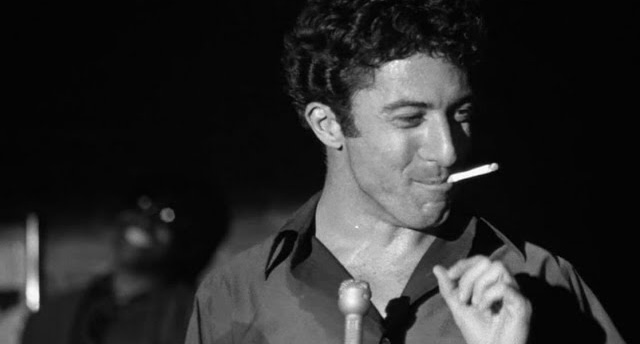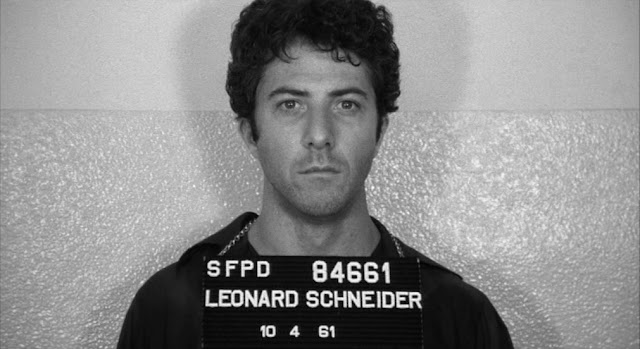I didn’t grow up with the comedy stylings of Lenny Bruce; that was before my time. But I did grow up with many comedians whose acts were definitely inspired by Lenny. Before I watched Bob Fosse’s biographical drama, Lenny, I tracked down one of Lenny Bruce’s performances and listened to him, wanting to get an idea of just what kind of stand-up comedian he was. I was surprised that what I heard was fairly tame compared to what came later from such comics as George Carlin, Richard Pryor, Sam Kinison, and many, many others. . The seeds of what stand-up comedy would morph into were here in Lenny’s act, and some people didn’t like that. Consequently, he was persecuted by law enforcers and spent a lot of his later years in and out of the court system battling charges for obscenity. All of this because he dared to speak up and say what most people didn’t dare give voice to.
I hate censorship. That’s not the same thing as saying I want to watch obscene things. I’m no prude, but there are certain things I’d prefer not to see in my entertainment. But I don’t believe I have the right to force someone else to believe the same way. Let them watch and listen to whatever they want, and let me have the same freedom. I also don’t believe in watching something that has been watered down by the censors. When I was growing up, I used to see movies edited for television, often badly. It’s become quite humorous for the occasional DVD to include a copy of the television cut as a bit of a novelty for those old days of yore. One of my favorites was Repo Man with the oft-repeated “Flip You,” that wasn’t fooling anyone watching it on TV. Worse than these TV edits was a live show filled with consenting adults being told they couldn’t hear a comedian use a certain word or phrase because someone in that audience might get offended. Yet these are adults who could make up their own mind if they wanted to buy a ticket to a show that would feature such language. Bob Fosse makes the comparison between “offensive” words and strip shows that show off nude models without the danger of being labeled “obscene.” Go figure.
The film, Lenny, defies conventional plot elements. It doesn’t stick to a linear structure but instead plays like a documentary at times, complete with inserted interviews, and jumping around the timeline to focus more on themes than plot. In some ways, this is not unlike a stand-up comic’s routine, hopping from topic to topic with little to bridge the topics. What we do get is Lenny Bruce (Dustin Hoffman) meeting Honey Harlow (Valerie Perrine), a stripper whom he refers to as his “Shiksa goddess.” They get married, have a daughter named Kitty, divorce, and both end up in legal trouble for different reasons. Anyone knowing the true story of Lenny Bruce knows that he burned out quickly in life, as so many entertainers do, and the film ends with his body being taken away, dead from an overdose of morphine.
Much of Lenny’s stand-up act, especially late in the game, is targeted at his legal issues, calling out the hypocrisy of his arrests and the stupidity of calling what he did obscene. He used his performances as a way to vocalize his frustrations and bring to light just what was being done to him. He also refused to compromise. He wouldn’t modify his content to appease those he was offending. His routines were often vulgar, but they were also insightful. People were booking him just to see what kind of outrageousness he would throw out there on the stage, and people were buying tickets to see whether he would be arrested during their specific performance. The film highlights this on more than one occasion, using it as another punchline in his material as he has the stage lights shift into the audience to showcase the officers waiting in the wings to arrest him should he say one thing they don’t like.
Bob Fosse has latched onto the insanity that was the counterculture movement in the 1960s and given it a tangible presence that only those who lived through it can fully appreciate. Unfortunately for me, I didn’t live through it and can only imagine the mindset of the time, even as I see it come full circle again as comics are getting canceled if their material offends a certain minority group in any way. Lenny, at one point, calls for a raise of hands in his audience, singling people out using racial slurs, including one for his own ethnicity. He uses the shock value of the slurs to address how we give those words power and that the words by themselves don’t hold that power. I can only imagine what Lenny Bruce would make of the world we currently live in. He would probably react to it in much the same way that George Carlin, who told roughly the same joke about racism in one of his own sets, did right up until his death.
What Dustin Hoffman is doing in this picture isn’t quite imitation. Having listened to one of Lenny’s performances and then seeing Hoffman doing some of the same jokes, it isn’t that great of an imitation. But that isn’t what Hoffman is trying to do. He’s going for the essence of Lenny Bruce, capturing the feel of the man, while also making the character his own. This is the right choice for this film as it was soon enough after Lenny’s death that audiences would have still remembered him. It avoids too much emphasis on how well Hoffman is imitating him and allows that focus to be more on the character itself. Hoffman’s amazing performance would get him an Oscar nomination.
This is a film aimed primarily at those who are already fans of Lenny Bruce. The way it is told and the emphasis it has will not showcase his humor in a way to convert people to him. Watching it after hearing one of his live shows is the best way for someone who doesn’t know him or his work to get into this picture. Without that, all there is to latch onto are images of a life in excess and some debauchery, and jokes that are either out of context or commenting on the scene we just saw. None of this gives us much for the character of Lenny Bruce that we couldn’t already glean off of what we already saw. It’s like watching a cynical episode of Seinfeld. It adds some context but not any enlightenment.
Bob Fosse nails the era and the mindset of Lenny Bruce— no easy feat— as well as the desperation that overcame him in his later years as the courts came down upon him. We get all of that emotion in his plea with the judge to not silence his voice. Hoffman is brilliant in this. The problem is that Lenny is just not a likable character, and no amount of humanizing him can change that. For fans of his work, this is a very good companion piece to his albums. To everyone else, it is just an interesting look into the life of a troubled comic, but it won’t get you to seek out his performances based on this film alone.
Academy Award Nominations:
Best Picture: Marvin Worth
Best Director: Bob Fosse
Best Actor: Dustin Hoffman
Best Actress: Valerie Perrine
Best Screenplay— Adapted from Other Material: Julian Barry
Best Cinematography: Bruce Surtees
____________________________________________________
Release Date: November 10, 1974
Running Time: 111 Minutes
Rated R
Starring: Dustin Hoffman and Valerie Perrine
Directed By: Bob Fosse








Comments
Post a Comment